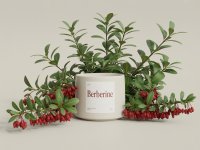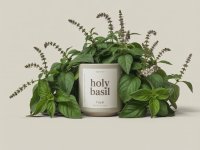
Rhodiola Rosea
Description
Rhodiola Rosea, also known as golden root, is an adaptogenic herb traditionally used to combat stress and fatigue. Originating from high-altitude regions, particularly in Asia and Europe, it has gained popularity for its potential to enhance mental and physical performance. This article provides a comprehensive overview of Rhodiola Rosea, exploring its benefits, dosage, side effects, and more.
Quick Overview: Rhodiola Rosea At-a-Glance
- Key Benefits: Enhanced stress resilience, improved mood, and reduced fatigue.
- Primary Mechanism: Modulates the stress response by influencing cortisol levels and neurotransmitter activity.
- Best For: Individuals seeking to improve their ability to cope with stress, enhance energy levels, and elevate mood.
- Typical Dose Range: 200-600mg daily, standardized to 3% rosavins and 1% salidroside.
- Key Caution/Consideration: May interact with certain medications, so consult with a healthcare professional before use.
Table of Contents
Categories & Effectiveness
Learn about our rating methodologyCognition
Concentration & Focus
4/10Moderate evidence of effectiveness
Memory & Recall
4/10Moderate evidence of effectiveness
Mood & Stress
Mood Elevation
7/10Strong evidence of effectiveness
Stress Resilience
7/10Strong evidence of effectiveness
Anxiety Relief
4/10Moderate evidence of effectiveness
Wellbeing Boost
4/10Moderate evidence of effectiveness
Systemic Health
Cellular Repair
4/10Moderate evidence of effectiveness
Immune System Balance
4/10Moderate evidence of effectiveness
Dosage & Side Effects
Recommended Dosage
- Best for: Individuals seeking to manage stress and improve energy levels.
- Avoid if: You are pregnant or breastfeeding without consulting a healthcare provider.
Potential Side Effects
Bioavailability & Half-Life
Interactions & Stacks
Recommended Products
Element One Rhodiola Rosea Kapseln, 5% Rosavin, 3% Salidrosid, 120 Stück 500mg Rhodiola-Rosea Extrakt pro Kapsel - hochdosiertes Rhodiola-Pulver - Rosenwurz Wurzel Kapseln - 4 Monatsvorrat - vegan
- Rated 4.8 stars by 112 customers
- Premium quality ingredients
Rhodiola Rosea Kapseln – 120 Kapseln – 500 mg 10:1 Extrakt Rosenwurz pro Kapsel – hochdosiert – Vegan – ohne Zusätze, Rosenwurz-Kapseln hochdosiert
- Rated 4.6 stars by 18 customers
- Premium quality ingredients
Rhodiola Rosea Extrakt - 120 Kapseln mit 500 mg - Premium Rohstoff: 3% Rosavin & 1% Salidrosid - Rosenwurz Wurzel Extrakt - vegan - hochdosiert
- Rated 4.4 stars by 106 customers
- Premium quality ingredients
As an Amazon Associate we earn from qualifying purchases. Prices and availability are accurate as of the date/time indicated and are subject to change.
Benefits by Use Case
stress reduction
Rhodiola Rosea helps the body adapt to stress by modulating cortisol levels and neurotransmitter activity. It can reduce feelings of anxiety and improve overall stress resilience. However, its effects may vary depending on the individual and the specific stressor.
Research Finding:
Treatment with R. rosea extract WS® 1375 over four weeks resulted in clinically relevant improvements in stress symptoms.
Improved Mood
Rhodiola Rosea may enhance mood by increasing serotonin and dopamine sensitivity in neurons. This can lead to reduced symptoms of depression and an overall improved sense of well-being. However, it's not a substitute for conventional treatments for major depressive disorders.
Research Finding:
Rhodiola rosea is described as a botanical adaptogen with putative anti-stress and antidepressant properties.
Mechanism of Action
Frequently Asked Questions
Where to Buy Rhodiola Rosea
Based on quality, price, and customer reviews, here are our top recommended Rhodiola Rosea supplements:
Rhodiola Rosea Kapseln - Hochdosiert: 500 mg pro Kapsel mit 3% Rosavinen & 1% Salidrosid - 4 Monate Vorrat (120 Kapseln) - Rosenwurz - Apothekenqualität - Green Naturals®
- Rated 4.4 stars by 933 customers
- Premium quality ingredients
Element One Rhodiola Rosea Kapseln, 5% Rosavin, 3% Salidrosid, 120 Stück 500mg Rhodiola-Rosea Extrakt pro Kapsel - hochdosiertes Rhodiola-Pulver - Rosenwurz Wurzel Kapseln - 4 Monatsvorrat - vegan
- Rated 4.8 stars by 112 customers
- Premium quality ingredients
Rhodiola Rosea Extrakt - 120 Kapseln mit 500 mg - Premium Rohstoff: 3% Rosavin & 1% Salidrosid - Rosenwurz Wurzel Extrakt - vegan - hochdosiert
- Rated 4.4 stars by 106 customers
- Premium quality ingredients
As an Amazon Associate we earn from qualifying purchases. Prices and availability are accurate as of the date/time indicated and are subject to change.
Summary & Expert Opinion
- Key Strengths: Adaptogenic properties, relatively safe, and may improve mood and stress resilience.
- Key Weaknesses: Effects can vary, and it may not be suitable for everyone.
- Recommendation: Consider Rhodiola Rosea for managing stress and improving mood, but consult a healthcare professional, especially if you have existing health conditions or are taking medications.
Deeper Technical Analysis:
Rhodiola Rosea's adaptogenic mechanisms are complex and involve multiple pathways. While it primarily influences the HPA axis and neurotransmitter systems, its effects can vary depending on individual factors and the specific stressor. The active compounds, rosavins and salidroside, interact with various receptors and enzymes in the brain, modulating the stress response and influencing mood regulation.
Pharmacokinetic studies show that salidroside, a key component of Rhodiola Rosea, is rapidly absorbed and eliminated, with a relatively short half-life. This suggests that frequent dosing may be necessary to maintain consistent effects. Furthermore, genetic variations in metabolic enzymes, such as CYP1A2, can influence the metabolism and duration of Rhodiola's effects.
Conflicting study results, such as the study on nursing students, highlight the importance of considering individual factors when evaluating Rhodiola's effectiveness. Methodological limitations, such as small sample sizes and variations in extract standardization, can also contribute to inconsistent findings.
Long-term effects and obscure risks of Rhodiola Rosea are not well-established, underscoring the need for further research. While generally considered safe, it's crucial to consult a healthcare professional before using Rhodiola Rosea, especially if you have existing health conditions or are taking medications that may interact with its active compounds.








